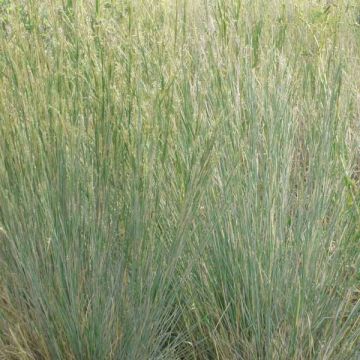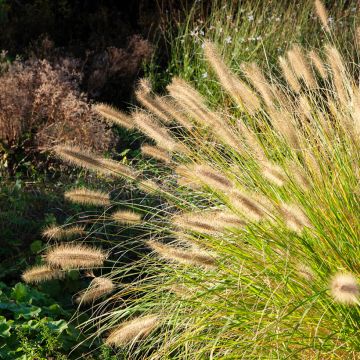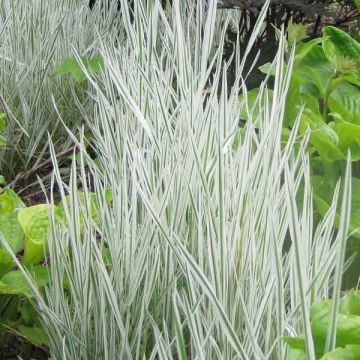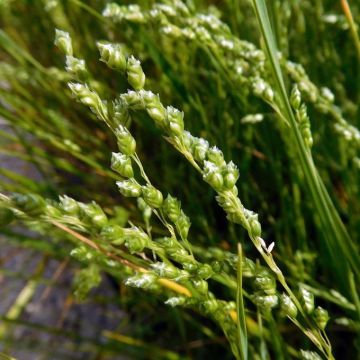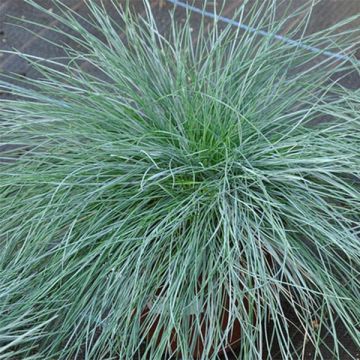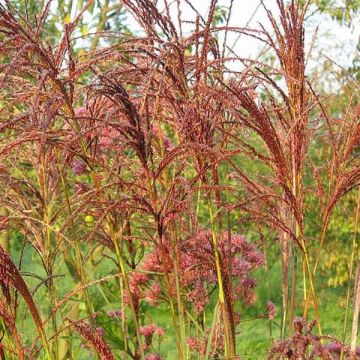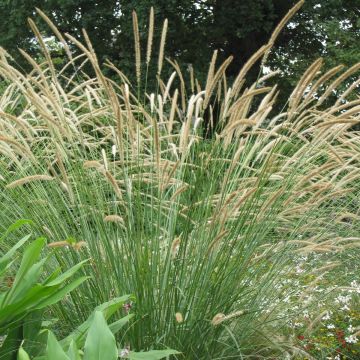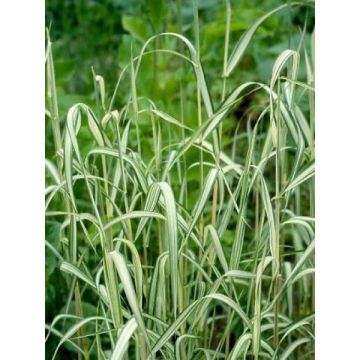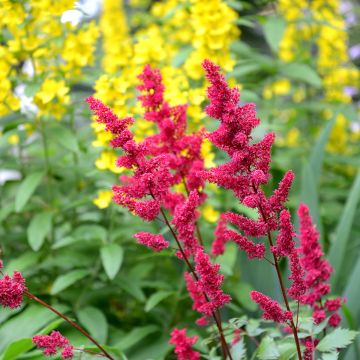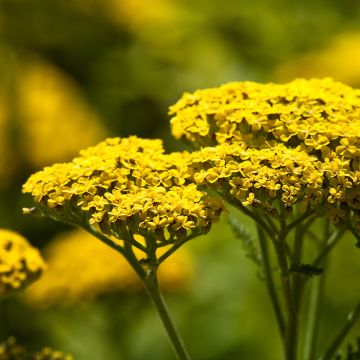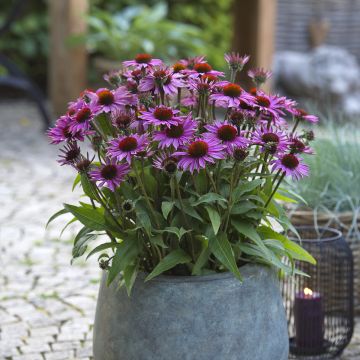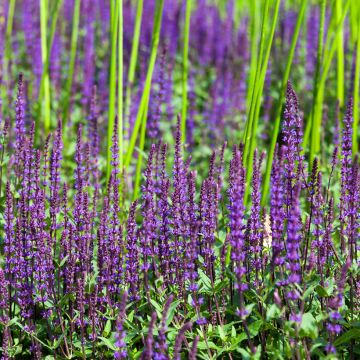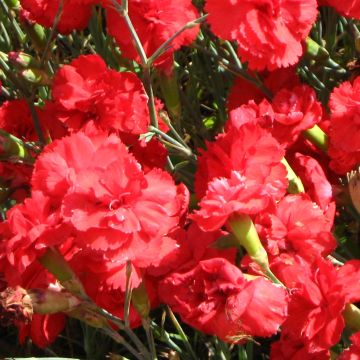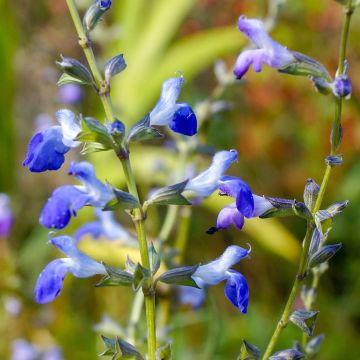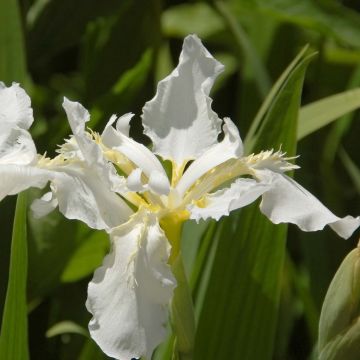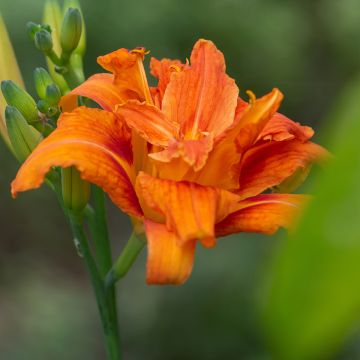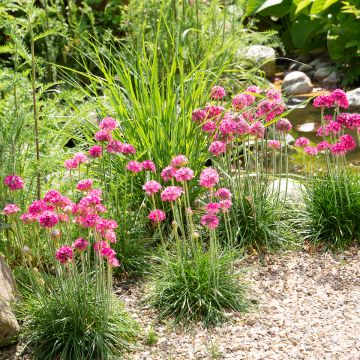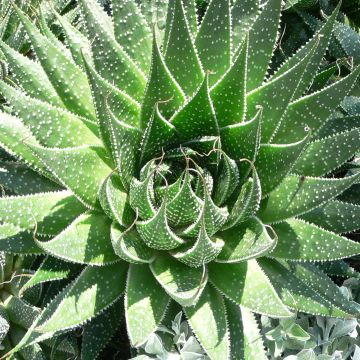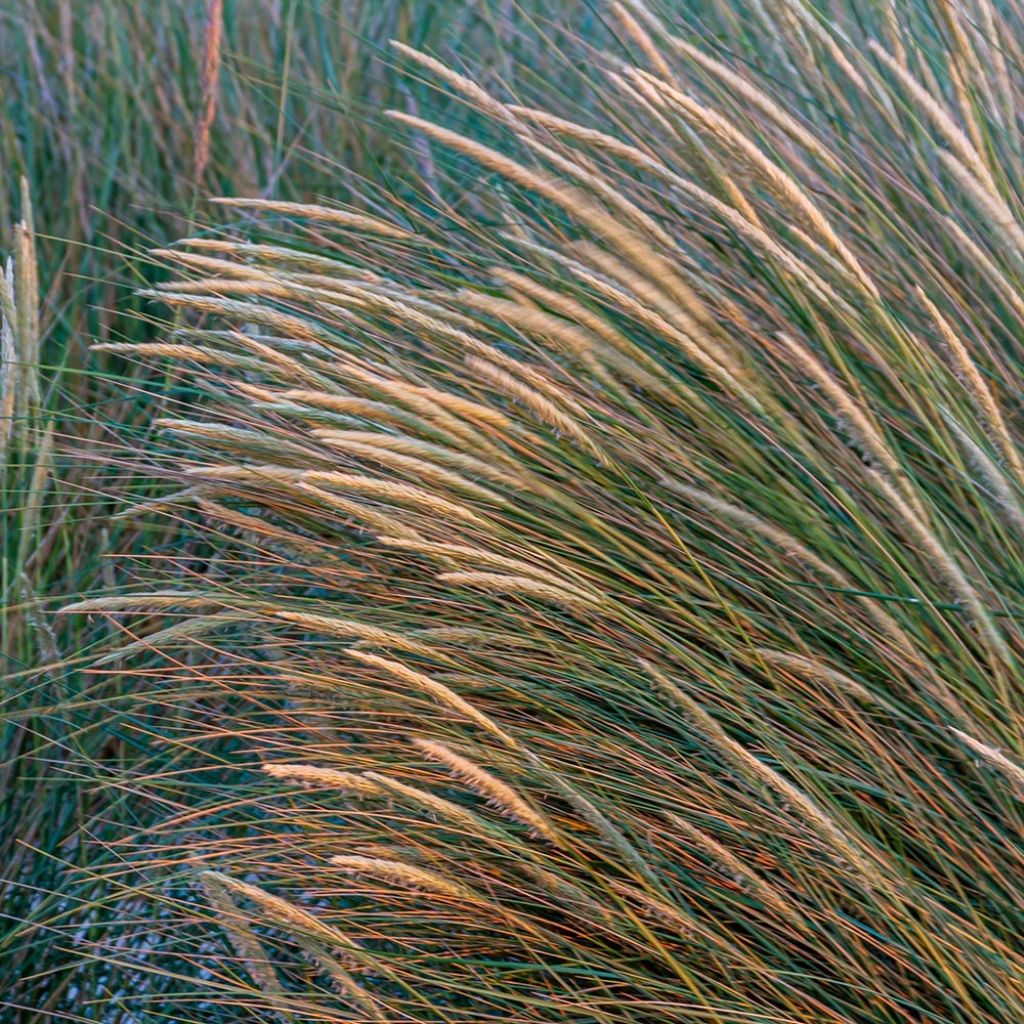

Ammophila arenaria
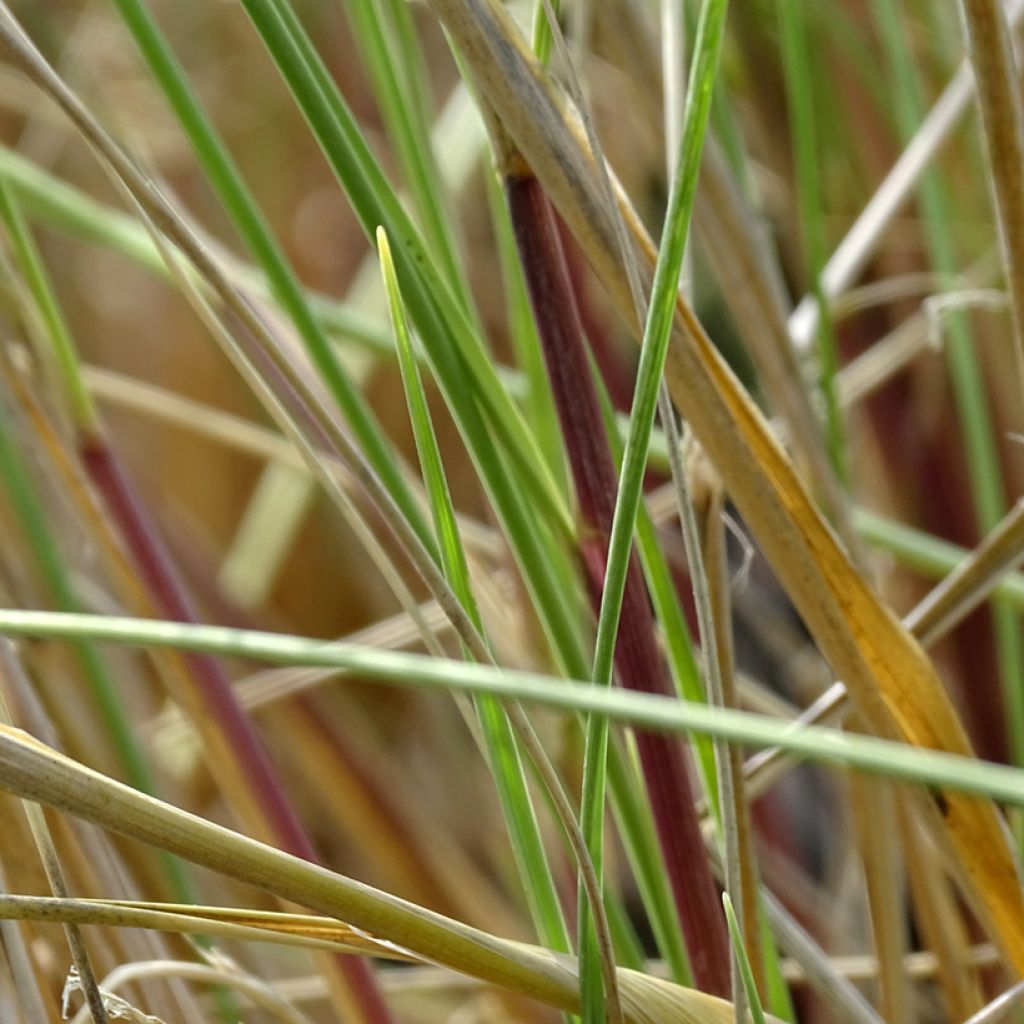

Ammophila arenaria
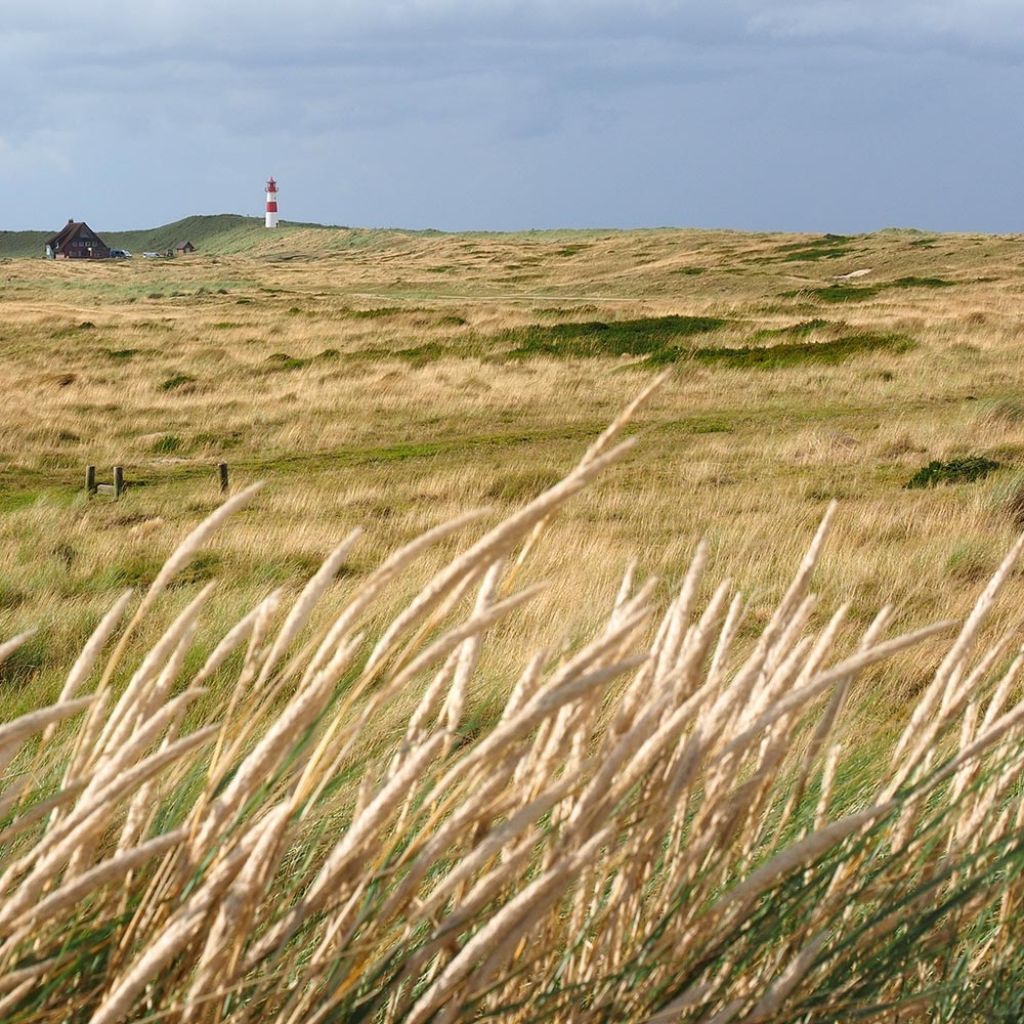

Ammophila arenaria
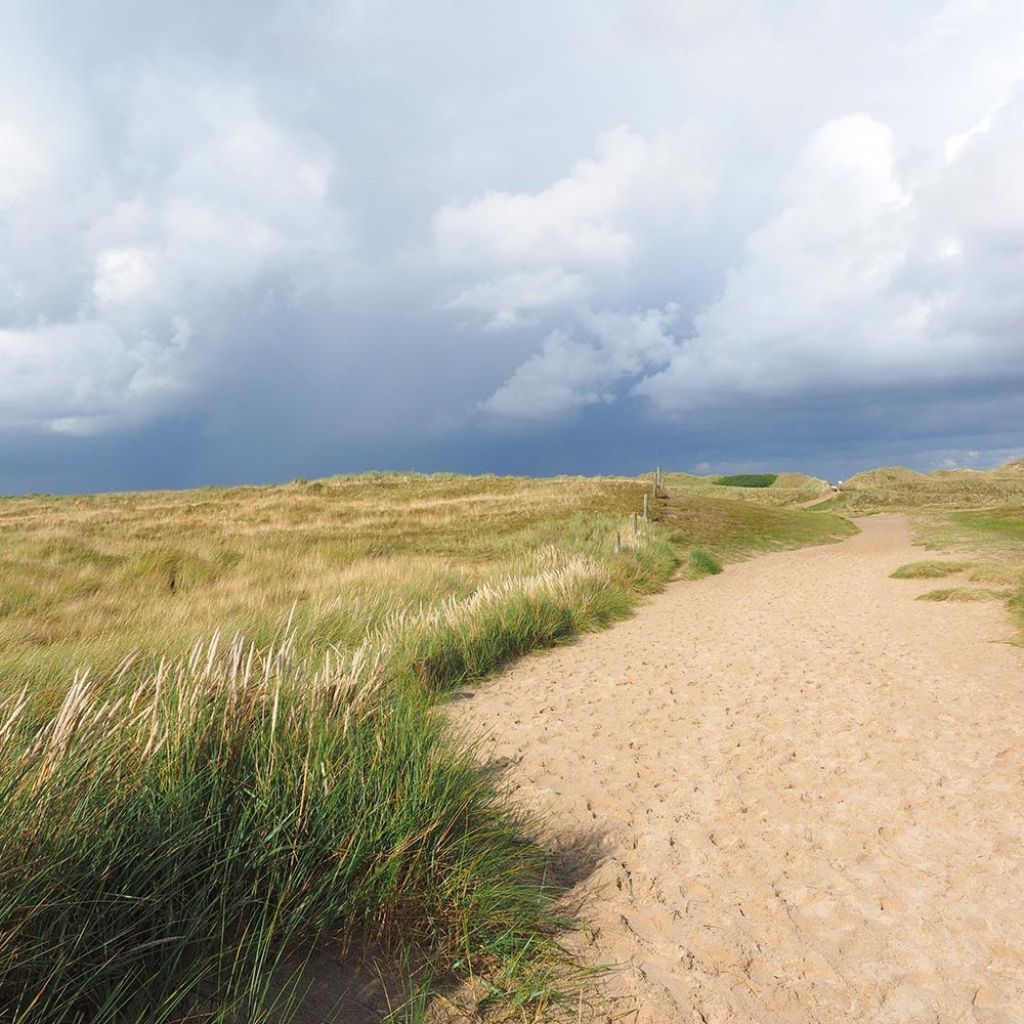

Ammophila arenaria
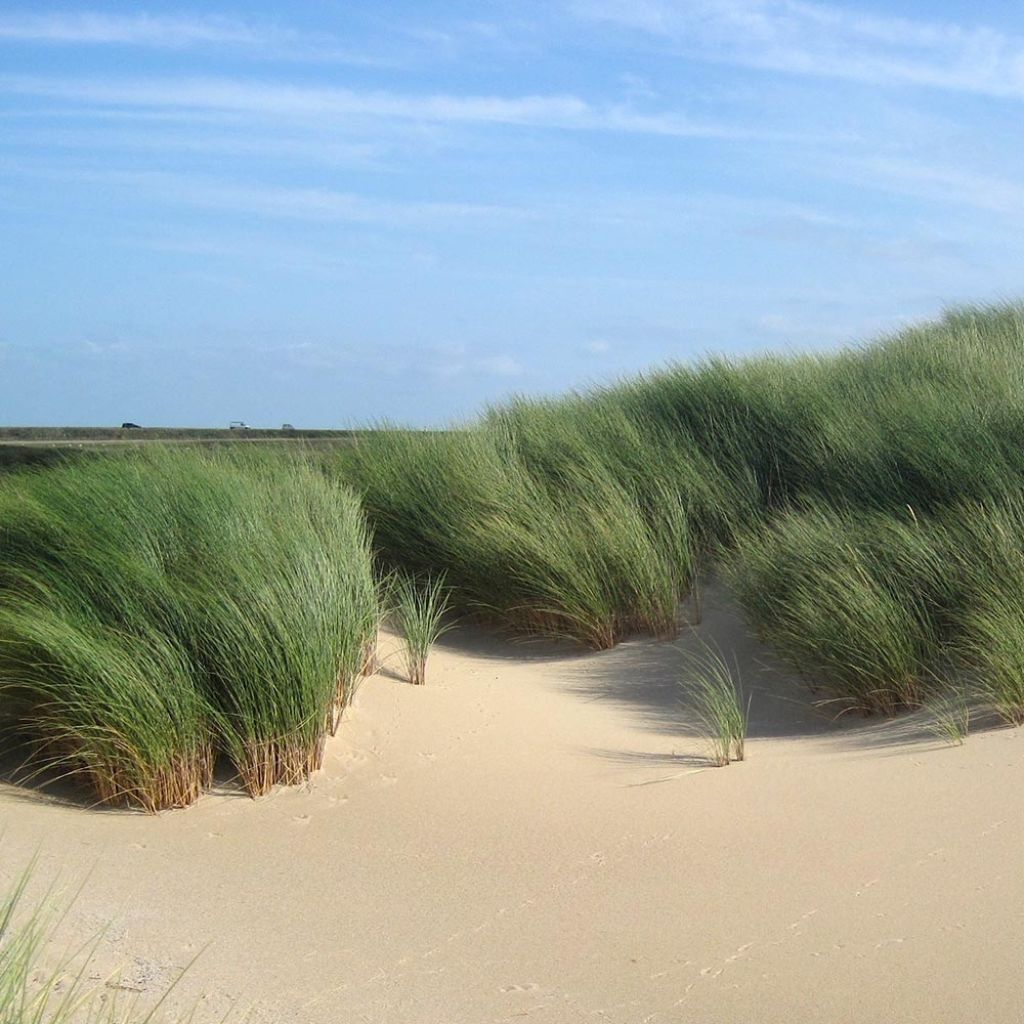

Ammophila arenaria
Ammophila arenaria
Ammophila arenaria
European Beachgrass, Marram, Marram grass, Mel grass, Sea matweed, Sea reed
The plant has taken well. It's not very bushy at the moment, but if it survives the winter, it will probably be more beautiful next year. Under the same conditions, the Anemanthele lessoniana has a greater impact from the first year.
Michèle, 26/08/2024
This item cannot be shipped to the selected country
Delivery charge from €5.90
Delivery charge from €5.90
More information
Schedule delivery date,
and select date in basket
This plant carries a 12 months recovery warranty
More information
We guarantee the quality of our plants for a full growing cycle, and will replace at our expense any plant that fails to recover under normal climatic and planting conditions.
From €5.90 for pickup delivery and €6.90 for home delivery
Express home delivery from €8.90.
From €5.90 for pickup delivery and €6.90 for home delivery
Express home delivery from €8.90.
Does this plant fit my garden?
Set up your Plantfit profile →
Description
Ammophila arenaria, also known as marram grass or sea reed, is a low-maintenance perennial grass with greenish-grey, evergreen ornamental foliage. It grows in stiff and sharp clumps, producing flowers in compact spikes, golden then beige, contrasting with the bluish reflections. Its rhizomatous stump is particularly useful for dune and sandy soil stabilization. Perfectly hardy, it is a water-efficient plant that naturally grows in saline and sandy soils. However, it also adapts well to all dry and sunny soils in a natural-style garden.
Ammophila arenaria, commonly known as marram grass or sand reed, is a perennial herbaceous plant in the large family of grasses. Native to Europe, North Africa, and the Middle East, it has been introduced to the Americas, Australia, and New Zealand where it can even become invasive on often very arid, sandy and saline soils. Its system is extremely powerful, allowing the grass to spread as a carpet that fixes the sand, quickly colonising dune environments.
Reaching 1.20 m (4ft) in height when flowering, it forms large clumps of foliage, about 70 cm (28in) in all directions. Its stump is vigorous, stoloniferous, and creeping. Its stems are stiff, upright, and arching, robust. Its persistent leaves are cylindrical like those of rushes, about 1 to 3 mm (1in) wide, smooth and greenish-grey in colour, becoming beige-ochre in winter and equipped with a nearly prickly tip. They are covered with a white to silvery blooms responsible for their bluish hue. The inflorescences appear from May to July, at the end of the floral stems, and remain on the plant until December. They are long spikes, 15 to 30 centimetres (6 to 12 inches) long, robust and compact, resembling those of wheat.
Marram grass is an ideal plant for coastal areas, especially for stabilising sand dunes. Stony and dry soils, as well as slightly arid slopes, are also favoured terrains for this grass that can withstand anything. It is also a very ornamental plant in borders or as edging, as well as for dressing up the terrace or patio in large flower pots. Due to its propensity to colonize the soil, it is preferable to plant it in a large buried container or to use anti-rhizome barriers if you want to use it sparingly in large borders. It can also be pruned short to create a sort of groundcover similar to a lawn. In a border, associate marram grass with low-maintenance asters, double-flowered fulva daylilies, rudbeckias, or large sedums.
This species is frequently attacked by the fungus Ustilago Hypodytes, also known as stem smut. No spike forms, instead large black mushrooms appear.
Report an error about the product description
Ammophila arenaria in pictures
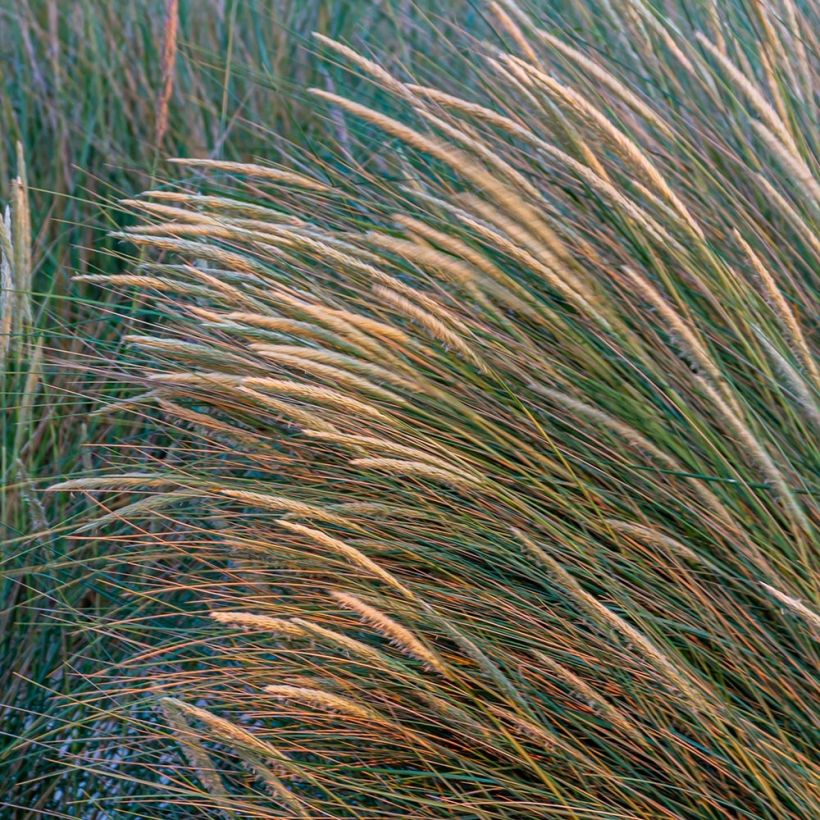

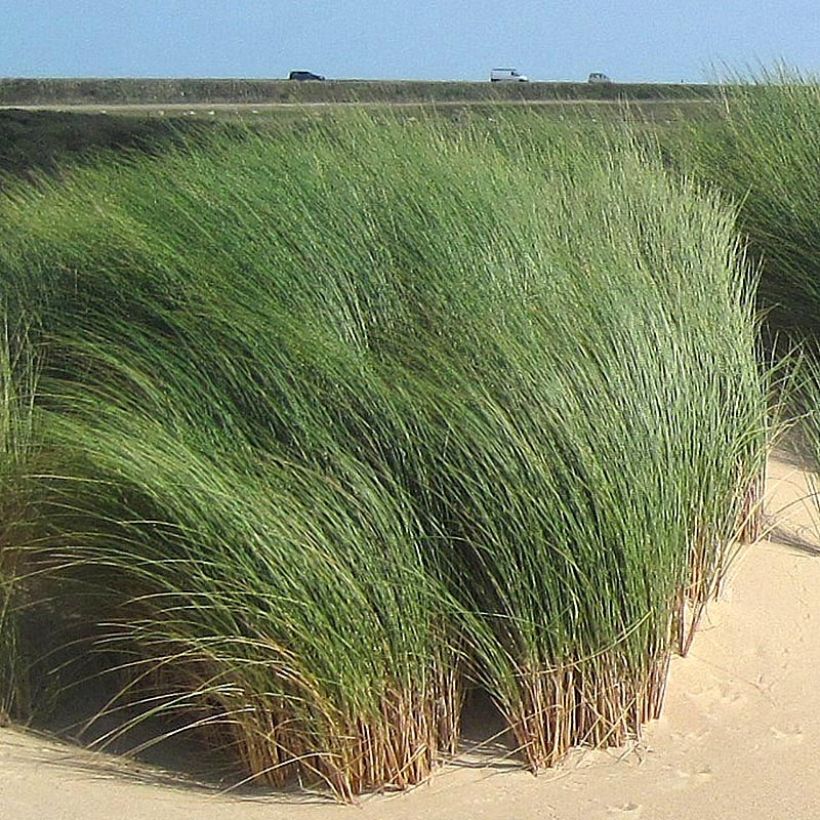

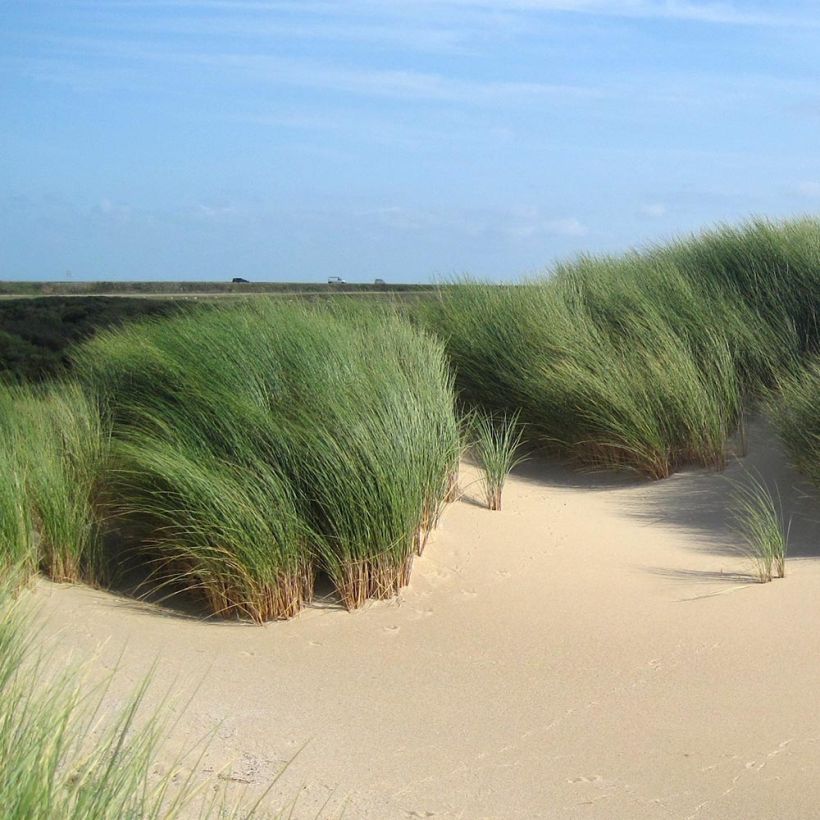

Flowering
Foliage
Plant habit
Botanical data
Ammophila
arenaria
Poaceae
European Beachgrass, Marram, Marram grass, Mel grass, Sea matweed, Sea reed
Psamma arenaria
Western Europe
Other Ornemental grasses A to Z
Planting and care
Ammophila arenaria or marram grass loves very sunny places. A quite hardy native plant, it still withstands hot and dry summers. It prefers a well-drained, light, and moderately fertile to poor soil. In nature, it grows in dunes, almost exclusively made of pure and salty sand. It also perfectly withstands sea spray.
The sea reed doesn't need a lot of nutrients, which can encourage lush vegetation at the expense of flowers. A spring compost can be beneficial in very poor soils. Grasses are good plants for containers: use a compost based potting soil and add 20% sand to lighten the mix. The foliage can be left until February, as it provides structure and movement in flowerbeds. The plants will then be pruned to 10 cm (4in) from the ground when vegetation resumes.
The presence of a parasite, Ustilago hypodytes, can prevent any flowering and spike formation. This results in the appearance of large black mushrooms.
Planting period
Intended location
Care
-
, onOrder confirmed
Reply from on Promesse de fleurs
Summer flowering perennials
Haven't found what you were looking for?
Hardiness is the lowest winter temperature a plant can endure without suffering serious damage or even dying. However, hardiness is affected by location (a sheltered area, such as a patio), protection (winter cover) and soil type (hardiness is improved by well-drained soil).

Photo Sharing Terms & Conditions
In order to encourage gardeners to interact and share their experiences, Promesse de fleurs offers various media enabling content to be uploaded onto its Site - in particular via the ‘Photo sharing’ module.
The User agrees to refrain from:
- Posting any content that is illegal, prejudicial, insulting, racist, inciteful to hatred, revisionist, contrary to public decency, that infringes on privacy or on the privacy rights of third parties, in particular the publicity rights of persons and goods, intellectual property rights, or the right to privacy.
- Submitting content on behalf of a third party;
- Impersonate the identity of a third party and/or publish any personal information about a third party;
In general, the User undertakes to refrain from any unethical behaviour.
All Content (in particular text, comments, files, images, photos, videos, creative works, etc.), which may be subject to property or intellectual property rights, image or other private rights, shall remain the property of the User, subject to the limited rights granted by the terms of the licence granted by Promesse de fleurs as stated below. Users are at liberty to publish or not to publish such Content on the Site, notably via the ‘Photo Sharing’ facility, and accept that this Content shall be made public and freely accessible, notably on the Internet.
Users further acknowledge, undertake to have ,and guarantee that they hold all necessary rights and permissions to publish such material on the Site, in particular with regard to the legislation in force pertaining to any privacy, property, intellectual property, image, or contractual rights, or rights of any other nature. By publishing such Content on the Site, Users acknowledge accepting full liability as publishers of the Content within the meaning of the law, and grant Promesse de fleurs, free of charge, an inclusive, worldwide licence for the said Content for the entire duration of its publication, including all reproduction, representation, up/downloading, displaying, performing, transmission, and storage rights.
Users also grant permission for their name to be linked to the Content and accept that this link may not always be made available.
By engaging in posting material, Users consent to their Content becoming automatically accessible on the Internet, in particular on other sites and/or blogs and/or web pages of the Promesse de fleurs site, including in particular social pages and the Promesse de fleurs catalogue.
Users may secure the removal of entrusted content free of charge by issuing a simple request via our contact form.
The flowering period indicated on our website applies to countries and regions located in USDA zone 8 (France, the United Kingdom, Ireland, the Netherlands, etc.)
It will vary according to where you live:
- In zones 9 to 10 (Italy, Spain, Greece, etc.), flowering will occur about 2 to 4 weeks earlier.
- In zones 6 to 7 (Germany, Poland, Slovenia, and lower mountainous regions), flowering will be delayed by 2 to 3 weeks.
- In zone 5 (Central Europe, Scandinavia), blooming will be delayed by 3 to 5 weeks.
In temperate climates, pruning of spring-flowering shrubs (forsythia, spireas, etc.) should be done just after flowering.
Pruning of summer-flowering shrubs (Indian Lilac, Perovskia, etc.) can be done in winter or spring.
In cold regions as well as with frost-sensitive plants, avoid pruning too early when severe frosts may still occur.
The planting period indicated on our website applies to countries and regions located in USDA zone 8 (France, United Kingdom, Ireland, Netherlands).
It will vary according to where you live:
- In Mediterranean zones (Marseille, Madrid, Milan, etc.), autumn and winter are the best planting periods.
- In continental zones (Strasbourg, Munich, Vienna, etc.), delay planting by 2 to 3 weeks in spring and bring it forward by 2 to 4 weeks in autumn.
- In mountainous regions (the Alps, Pyrenees, Carpathians, etc.), it is best to plant in late spring (May-June) or late summer (August-September).
The harvesting period indicated on our website applies to countries and regions in USDA zone 8 (France, England, Ireland, the Netherlands).
In colder areas (Scandinavia, Poland, Austria...) fruit and vegetable harvests are likely to be delayed by 3-4 weeks.
In warmer areas (Italy, Spain, Greece, etc.), harvesting will probably take place earlier, depending on weather conditions.
The sowing periods indicated on our website apply to countries and regions within USDA Zone 8 (France, UK, Ireland, Netherlands).
In colder areas (Scandinavia, Poland, Austria...), delay any outdoor sowing by 3-4 weeks, or sow under glass.
In warmer climes (Italy, Spain, Greece, etc.), bring outdoor sowing forward by a few weeks.


































